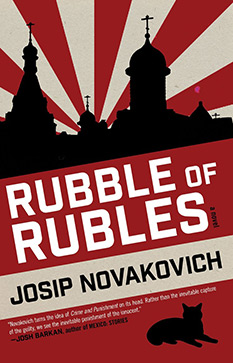
It’s 2006 and David Dvornik is an American investment banker who lost his shirt in the Enron scandal. Of eastern European descent and something of a Russophile, he travels to St. Petersburg to clear his head. With vague plans to write some articles, he hails a cab to Kresty prison where he hopes to do some research. Like most “cabs” in post-Soviet Russia, the cab isn’t a cab but an enterprising driver who negotiates the fare on the spot and takes David on a wild ride through the streets of St. Petersburg. Their exchange is as fast paced as the ride and reads like the script of an absurdist play.
Near the Litenyi Bridge, the driver strikes a pedestrian but, because he appears to be a police officer, he makes the incident go away. It was nothing. The victim was drunk. He was pushed in front of the car. Life is cheap. A chapter later, David sees a body in the street not far from his rental unit. A waitress tries to resuscitate the victim and David notes that her miniskirt isn’t fully zipped up. “I contemplated the possibility that my life would pass and I would have never slept with a Russian.” No one appears to care about the body and hours pass without any effort to dispose of it. It continues to lie there, rotting, with the waitress’s lipstick on its face.
So things go, in what seems a picaresque account of random episodes, conversations with Russian women in cafés, seemingly trivial speculations, unfulfilled plans. And then, nearly halfway through the novel, an incident dispels the fog of random encounters. David has drunk a couple beers and, afflicted as he is with a middle-aged bladder, he needs to relieve himself but can find nowhere to go. He ducks into the shadows of the Kazan cathedral and pisses against a column, and it is at this point that Novakovich’s novel joins that rarefied collection of literary piss novels.
Foremost amongst literary piss references is Tristram Shandy where the narrator recalls pissing out a window as five year old boy when the window sash fell and administered an unplanned circumcision. Equally worthy is Henry Miller’s Black Rain in which the author offers up what may best be described as a hymn to the manly virtue of pissing in public. I’m not certain that there’s an established literary meaning associated with the act of pissing. I’m no expert on the cultural significance of streaming media. But one possibility may be found in Milan Kundera’s novel, The Unbearable Lightness of Being, which Novakovich explicitly mentions. There, Kundera suggests that without shit, art is reduced to kitsch; a full account of our lives has to include even the ugliness of those bodily functions we would prefer to hide from view. Presumably, Kundera’s comments regarding shit extend to piss.
However we choose to interpret the act of pissing, especially when it happens on a cathedral wall, police officers apprehend David in the act and humiliate him by shining their flashlights on him. While ostensibly arresting him for the offence of public urination, they later inform him that he is being held for the suspected murders of two Georgian wine merchants, one pushed in front of a car near Litenyi Bridge, the other found dead in the street outside his rental unit. He finally gets his visit to Kresty prison but the research he conducts will be, shall we say, more thorough. Here, we learn what life is like in the prison of a post-Soviet laissez-faire economy. The warden will make any accommodation as long as David is willing to pay for it. In fact, there is the sinister suggestion that his prison term is determined by his viability as a source of income to the warden and guards, but the term won’t end with freedom.
Novakovich is quick to return the novel from these dark suggestions to its native satirical tone. A couple years into his sentence, David persuades the warden to arrange a visit with no less than Vladimir Putin, and the Russian president’s diminutive stature becomes the occasion for a terrible pun: the man is Lilli-putin. Putin offers to release David into a life of Russian luxury if David will perform a service: poison the president of Georgia. So David travels to Tbilisi, armed with a plutonium capsule stuffed up the anus of his pet cat (see Kundera, above). He poses as a wine merchant looking to expand the reach of Georgian wines into new markets. However, his meeting with the president doesn’t go as planned. The president is a gregarious man who loves wine and, together, they get roaringly drunk. In such a state, David is incapable of sticking to his plan and the Georgian president lives to see another day.
Satire can be a wonderful weapon to accord a tyrant precisely the stature he deserves. There is, after all, nothing worse to a narcissist than the feeling that he’s being laughed at. In Novakovich’s hands, Putin is a little fellow who lords it over a land of grasping buffoons while the rest of us look on and laugh.
Rubble of Rubles, by Josip Novakovich, from Dzanc Books
Read my 2012 review of Novakovich’s Shopping for a Better Country